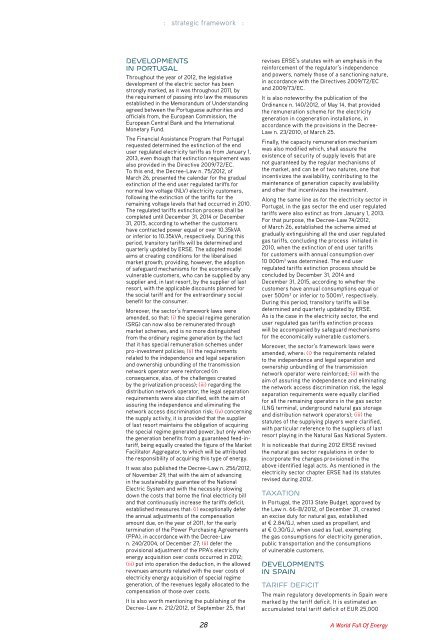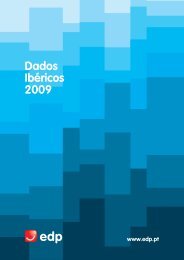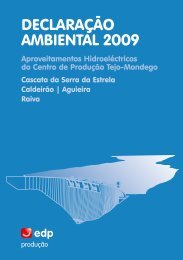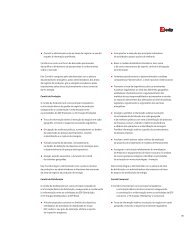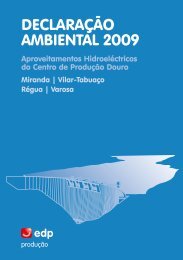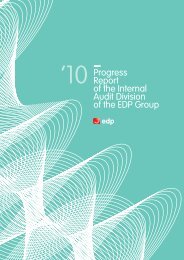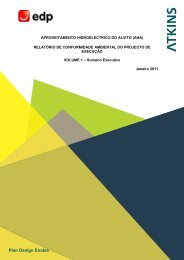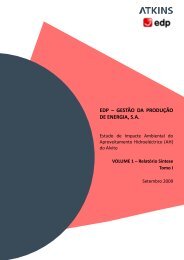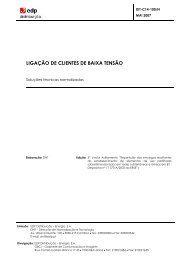Annual Report - EDP
Annual Report - EDP
Annual Report - EDP
- No tags were found...
Create successful ePaper yourself
Turn your PDF publications into a flip-book with our unique Google optimized e-Paper software.
: strategic framework :Developmentsin PortugalThroughout the year of 2012, the legislativedevelopment of the electric sector has beenstrongly marked, as it was throughout 2011, bythe requirement of passing into law the measuresestablished in the Memorandum of Understandingagreed between the Portuguese authorities andofficials from, the European Commission, theEuropean Central Bank and the InternationalMonetary Fund.The Financial Assistance Program that Portugalrequested determined the extinction of the enduser regulated electricity tariffs as from January 1,2013, even though that extinction requirement wasalso provided in the Directive 2009/72/EC.To this end, the Decree-Law n. 75/2012, ofMarch 26, presented the calendar for the gradualextinction of the end user regulated tariffs fornormal low voltage (NLV) electricity customers,following the extinction of the tariffs for theremaining voltage levels that had occurred in 2010.The regulated tariffs extinction process shall becompleted until December 31, 2014 or December31, 2015, according to whether the customershave contracted power equal or over 10.35kVAor inferior to 10.35kVA, respectively. During thisperiod, transitory tariffs will be determined andquarterly updated by ERSE. The adopted modelaims at creating conditions for the liberalisedmarket growth, providing, however, the adoptionof safeguard mechanisms for the economicallyvulnerable customers, who can be supplied by anysupplier and, in last resort, by the supplier of lastresort, with the applicable discounts planned forthe social tariff and for the extraordinary socialbenefit for the consumer.Moreover, the sector’s framework laws wereamended, so that: (i) the special regime generation(SRG) can now also be remunerated throughmarket schemes, and is no more distinguishedfrom the ordinary regime generation by the factthat it has special remuneration schemes underpro-investment policies; (ii) the requirementsrelated to the independence and legal separationand ownership unbundling of the transmissionnetwork operator were reinforced (inconsequence, also, of the challenges createdby the privatization process); (iii) regarding thedistribution network operator, the legal separationrequirements were also clarified, with the aim ofassuring the independence and eliminating thenetwork access discrimination risk; (iv) concerningthe supply activity, it is provided that the supplierof last resort maintains the obligation of acquiringthe special regime generated power, but only whenthe generation benefits from a guaranteed feed-intariff,being equally created the figure of the MarketFacilitator Aggregator, to which will be attributedthe responsibility of acquiring this type of energy.It was also published the Decree-Law n. 256/2012,of November 29, that with the aim of advancingin the sustainability guarantee of the NationalElectric System and with the necessity slowingdown the costs that borne the final electricity billand that continuously increase the tariffs deficit,established measures that: (i) exceptionally deferthe annual adjustments of the compensationamount due, on the year of 2011, for the earlytermination of the Power Purchasing Agreements(PPA), in accordance with the Decree-Lawn. 240/2004, of December 27; (ii) defer theprovisional adjustment of the PPA’s electricityenergy acquisition over costs occurred in 2012;(iii) put into operation the deduction, in the allowedrevenues amounts related with the over costs ofelectricity energy acquisition of special regimegeneration, of the revenues legally allocated to thecompensation of those over costs.It is also worth mentioning the publishing of theDecree-Law n. 212/2012, of September 25, that28revises ERSE’s statutes with an emphasis in thereinforcement of the regulator’s independenceand powers, namely those of a sanctioning nature,in accordance with the Directives 2009/72/ECand 2009/73/EC.It is also noteworthy the publication of theOrdinance n. 140/2012, of May 14, that providedthe remuneration scheme for the electricitygeneration in cogeneration installations, inaccordance with the provisions in the Decree-Law n. 23/2010, of March 25.Finally, the capacity remuneration mechanismwas also modified which, shall assure theexistence of security of supply levels that arenot guaranteed by the regular mechanisms ofthe market, and can be of two natures, one thatincentivizes the availability, contributing to themaintenance of generation capacity availabilityand other that incentivizes the investment.Along the same line as for the electricity sector inPortugal, in the gas sector the end user regulatedtariffs were also extinct as from January 1, 2013.For that purpose, the Decree-Law 74/2012,of March 26, established the scheme aimed atgradually extinguishing all the end user regulatedgas tariffs, concluding the process initiated in2010, when the extinction of end user tariffsfor customers with annual consumption over10 000m 3 was determined. The end userregulated tariffs extinction process should beconcluded by December 31, 2014 andDecember 31, 2015, according to whether thecustomers have annual consumptions equal orover 500m 3 or inferior to 500m 3 , respectively.During this period, transitory tariffs will bedetermined and quarterly updated by ERSE.As is the case in the electricity sector, the enduser regulated gas tariffs extinction processwill be accompanied by safeguard mechanismsfor the economically vulnerable customers.Moreover, the sector’s framework laws wereamended, where: (i) the requirements relatedto the independence and legal separation andownership unbundling of the transmissionnetwork operator were reinforced; (ii) with theaim of assuring the independence and eliminatingthe network access discrimination risk, the legalseparation requirements were equally clarifiedfor all the remaining operators in the gas sector(LNG terminal, underground natural gas storageand distribution network operators); (iii) thestatutes of the supplying players were clarified,with particular reference to the suppliers of lastresort playing in the Natural Gas National System.It is noticeable that during 2012 ERSE revisedthe natural gas sector regulations in order toincorporate the changes provisioned in theabove identified legal acts. As mentioned in theelectricity sector chapter ERSE had its statutesrevised during 2012.TaxationIn Portugal, the 2013 State Budget, approved bythe Law n. 66-B/2012, of December 31, createdan excise duty for natural gas, establishedat € 2.84/GJ, when used as propellant, andat € 0.30/GJ, when used as fuel, exemptingthe gas consumptions for electricity generation,public transportation and the consumptionsof vulnerable customers.Developmentsin SpainTariff DeficitThe main regulatory developments in Spain weremarked by the tariff deficit. It is estimated anaccumulated total tariff deficit of EUR 25,000A World Full Of Energy


